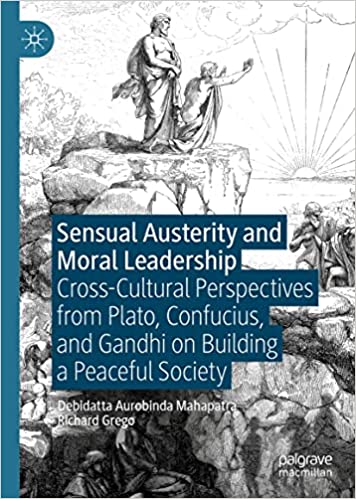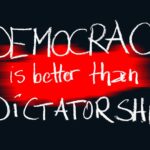We hope you enjoy our articles. Please note, we may collect a share of sales or other compensation from the links on this page. Thank you if you use our links, we really appreciate it!
In our recent book, Sensual Austerity and Moral Leadership: Perspectives From Plato, Confucius and Gandhi on Building a Peaceful Society we advance a two-fold thesis: One claim is that a close reading of classical social-political thought across major world cultures (represented in our study of Plato in the West, Confucius in east Asia, and Gandhi in south Asia) indicates that they all recognized an important connection between sensual austerity (temperance regarding indulgence in, or satisfaction of, physical-emotional-sensate pleasures and appetites) and the personal requirements necessary for the demands of leadership. The second corollary (but perhaps even more trenchant) claim is that such austerity is important because of its relationship to moral character, which is perhaps the most essential aspect of capable leadership. All three thinkers thought that learning to command , rather than be commanded by, one’s sensual appetites is key to cultivating the kind of mindfulness and self-control necessary for developing a strong sense of self-knowledge and personal virtue, and that this character-trait is essential to being a responsible citizen and capable leader.
At the outset of Western civilization’s intellectual legacy, Plato‘s seminal worldview depicted reality as hierarchical in nature, with a transcendent, immaterial, cosmic intelligence at its pinnacle—creating, encompassing, and determining the nature of the lower material reality that humans and human communities are aspects of. Although this cosmic intelligence is integral to the material world, it is also largely invisible to it (in the sense, for instance, that our experience of vision –which makes a visible world possible—can never be a visible object itself). Understanding this cosmic intelligence therefore involves deep study, extraordinary awareness, a superior intellect, and cultivating an extraordinary moral character: a feat that few are capable of achieving. However, if we want to attain such knowledge (which we must, if we wish to live in an enlightened, healthy and happy world), our society must enable as many people as possible do so, and it must abide by the guidance that these wise and precious few souls are able to convey. In his Republic and elsewhere, Plato prescribed a system of social and political order whose hierarchy mirrors the cosmic order: with the wisest few of its members (who have attained supreme knowledge by transcending the limitations of the material-sensual world) at its top (The Philosopher Kings), those who have mastered its material distractions (but still desire its worldly rewards) in the middle (the Guardians: warriors and public officials), and those who are still ruled by their material-sensual appetites at the bottom (laborers and merchants). In this way, mirroring the individual who has forsaken the allure of superficial pleasures and idle distractions in favor of his/her intellectual and spiritual quest for ultimate truth, a healthy society is governed by those citizens who have done likewise.
Confucius, establishing the intellectual foundations of east Asian civilization, shared a worldview similar to Plato’s within the context of his own cultural legacy: valorizing “the sage” whose life remains devoted to moral excellence. For Confucius, societies reflect the moral character of their citizens just as the morality of individual citizens is shaped by society, and it is essential for those few sages within whom society has cultivated a sufficient level of wisdom in this regard, to guide their communities in turn. Gandhi, representing the culmination of ancient Hindu civilization (reconfigured but not radically altered within the milieu of modern India), followed both Plato and Confucius along these same lines. Those souls who (through self-renunciation and self-cultivation–the Brahmacharya path) have attained knowledge of ultimate reality (“Truth”, “God” or “satyagraha”) and have transcended the limitations of material existence and the illusional world (Maya) that it is part of, are the visionaries best-suited to lead communities in transcending these limitations.
Despite the advent of modernity and globalization over the past several centuries in world history –levelling social-political and class hierarchies in favor of more egalitarian, democratic societies and values than Plato or Confucius could have conceived– social and political theories and institutions have nonetheless retained their classical concern for civic and personal virtues, even as classical social-political forms and institutions have evolved into more modern ones. Plato’s aristocratic hierarchy of political authority has been transformed into the social contract, free-markets, and representative governments, in which responsibility for social leadership (and the moral character required for it) is located in the wisdom of the ‘common man’ and the ‘will of the people’. Confucius’ sagely morality is no longer the preserve of the well-educated and well-mannered aristocratic “gentleman” and is now the duty of every citizen with a stake in the social order. However, this transition to modernity still hasn’t, by classical lights, changed the nature of morality, society or leadership—which remain dependent on the leader’s devotion to moral integrity achieved via self-mastery, sensual austerity, and spiritual transcendence. The contemporary moral leader has just become the ‘average person’ devoted to ‘self-improvement’ and ‘personal achievement’, rather than a privileged elite. Rather than the morally superior aristocracy of classical civilization, democratic leadership in post-modern egalitarian societies requires the support of a knowledgeable, conscientious, and ethical citizenry.
Indeed, classical moral elitism regarding leadership still seems, in many ways, pretty self-evident and unremarkable now: Everyone still at least pays lip-service to the notion that leadership is earned through superior self-discipline and strength of character. They still claim that healthy professional, civic, and political communities, in order to thrive, require governance by morally responsible leaders of exceptional rectitude. Business leaders motivated by unrestrained greed wind-up ruining their own corporations and bankrupting their stakeholders. Professional administrators motivated by unrestrained narcissism create unwieldy bureaucracies and dysfunctional organizational cultures. Political leaders motivated by unrestrained self-interest become either demagogs or despots.
We go on to argue however, that the levelling of social hierarchies in the historical transition from classical civilization to our modern era has also involved, at least in popular culture, a corresponding levelling of the moral-spiritual hierarchies that classical thinkers prized—leaving contemporary global civilization (devoid of ‘higher values’ and driven solely by a utilitarian ethic of commercial success, bureaucratic efficiency, scientism, and power) without the moral authority of classical virtues and, in some respects, hostile to the very notion of moral authority or virtue at all. It is certainly common knowledge that decline of aristocratic social orders, ethnic distinctions, and economic hierarchies, combined with the corresponding rise of democratic societies, egalitarian values, and a globalized secular-commercial culture, have inaugurated a unique era in world-history; one that has been rightfully celebrated as marking our liberation in many ways from the onerous burden of authoritarianism, imperialism and repression in social-political life. The recent resurgence of political authoritarianism around the world notwithstanding, the past several centuries have witnessed the eradication of one oppressive political, legal, religious, and economic form of social injustice after another. In general, by many measures of material health and well-being, people around the world live more prosperously and freely than at anytime before. Public intellectuals from Francis Fukuyama to Steven Pinker have popularized the notion that Enlightenment philosophy, the marvels of modern science, and the benefits of neo-liberal politics and economics, represent the crowning creative achievement of global civilization.
However, it is equally obvious by almost any measure that these conditions have simultaneously fostered a culture of social alienation, moral impoverishment, and personal despair. Often ignored and overlooked by thinkers like Fukuyama and Pinker, consensus findings of the past half-century’s studies on social indicators (including everything from increasing mental health problems, to feelings of loneliness and despair, to declining participation in religious organizations, civic groups, and political activism, to fracturing community and family relationships, to lack of confidence in social-legal institutions and leaders, to increasingly unsustainable levels of public incivility and polarization) reveal that, however vigorous its current level of superficial material achievement may be, contemporary post-modern civilization’s level of psychic and moral achievement (what social commentator David Brooks has termed the “eulogy achievements” of character, rather than the “resume achievements” of material success) has declined along with its fidelity to classical virtues.
This decline has resulted in a reconceptualization of what we now envision as a healthy, functional political community and capable leadership. Without any stable sense of moral authority (predicated on some standard, however vaguely and liberally defined, of the universal kind of transcendent virtue and truth championed by the classical thinkers in our study) contemporary civilization is left with only immediate material benefit as its ‘moral’ guide. The capable political leader in classical thought, as a figure judged worthy to determine a community’s destiny by virtue of his/her moral excellence and personal fortitude, has devolved in our modern social ethos into simply an efficient manager of material and human resources. Moral character as a measure of capable leadership has become irrelevant to the conduct of personal, professional, political, economic or community life in our contemporary world. Citizens are only concerned with what a leader can produce for them, and leaders are only concerned about how to most effectively remain in power. As we note
“Modern political administration is an amoral public domain in which the ideal of rule via Platonic philosopher kings has been replaced by policy management and technocracy. Value-neutral bureaucracies run by municipal planners and professional administrators have replaced moral leadership in political life.”
The recent Clinton and Trump administrations in U.S. politics (Clinton, a relatively progressive Democrat, and Trump a relatively conservative Republican) are good examples of this phenomenon. Divided by approximately twenty years and vastly different policy agendas, both Presidents enjoyed professional success and relative popularity during their tenure –alongside wide public perception of their moral and character deficiencies. Clinton was perceived as dishonest, disloyal, and lecherous (in one popular journalist’s estimation: “a man who can be wonderfully warm and empathetic but also ruthlessly cold and deceitful. …one also glimpses how callously he uses people, including his closest staff and long-held friends. He charms the people he needs, then sacrifices them to tactical necessities, then pleads for forgiveness or, at least, a neutral silence.”) For his part, Trump was perceived as “pathologically narscissistic,” “rude”, and “unscrupulous”(to borrow terms drawn from Pew surveys to media headlines). However, despite their perceived lack of moral character, even among their supporters, both also received enthusiastic support from their political constituencies. In survey after survey, voters indicated that the reason for this was because they cared less about a leader’s moral character and much more about his or her success in delivering on popular policy initiatives. During the Clinton administration, this voter preference for expedience over moral integrity was already high, with only three quarters of Americans thinking that moral integrity in a political candidate was “very important”. In the decades between Clinton and Trump, this number decreased to roughly 55%, and both retained loyal followings even though both were also overwhelmingly perceived by voters generally as immoral people (Clinton by over 50 % and Trump by nearly 90%). Further, current moral assessments of political leadership appear driven by the perception of political expedience, rather than the other way around: with overwhelmingly large numbers of voters basing their assessment of each President’s moral integrity on these leader’s support for the voter’s favored policy items (How often, for instance, do we hear the now unabashedly biased media news outlets extolling the moral virtue of their favored political leaders for promoting a policy that they later deride as immoral when a rival leader promotes it….)
Thus, one analyst’s assessment of political values during the Clinton era seems at least as true—if not even more so– today:
“People expect that the president will be dishonest, and they are thus less concerned with his moral character and more concerned with his performance. This in part explains why Bill Clinton has been able to survive as president and was even reelected despite a persistent cloud of scandal. The economy is good, people are working and Clinton can act as a strong leader when necessary. He may be dishonest, but that doesn’t seem to affect his performance as president, and so he gets high approval ratings even while being impeached by Congress. Those who claim that his moral failings should disqualify him from running the country find themselves in the minority.”
Indeed, we commonly hear people proclaim (sometimes admiringly) about Presidents and CEOs: “I know he’s a crook and a weasel, but he gets things done. It’s the bottom-line that matters.” In this current trend we witness a radical departure from the worldview and political ideology of the classical philosophers: Because of their conviction that character traits like flagrant dishonesty and pathological narcissism are clearly moral failings in political leaders –failings that present a danger to the political communities whose interests they are entrusted to protect– classical thinkers also considered the moral character and virtues exhibited by political leaders to be all-important, as this is both reflected in and engendered by the communities they lead. For Plato, Confucius, and Gandhi, ethical principles are real and universal, there are clear standards of morality that are derived from them, and a community’s health rests on the extent to which its leadership personally embodies and promotes these principles. For our post-modern age, in contrast, ethics are a just another subjective social convention, there is a perceived separation of morality from administration of the state (almost as stark as the separation of church and state), and political-professional leadership is about delivering material results rather than promoting virtuous ideals. Certainly many prominent thinkers in the modern ‘realist’ tradition in political theory from Machiavelli to Morgenthau, have regarded moral considerations as largely irrelevant to, if not positively inimical to, efficient and productive statecraft.
It may be that this “brave new world” kind of amoral but materially efficient public leadership is actually a blessing. The world has certainly benefited in many tangible ways from our validation of pragmatic, concrete, material success –unimpeded by the sort of outdated and intrusive moralizing constraints on progress we understandably associate with elitist pre-modern institutions like religious dogma and socio-economic casts. However, as the current increasingly ominous social-political climate in the US and around the world (created largely by a crisis in leadership) also indicates: we ignore the importance of morality in civic life and leadership at our peril.



